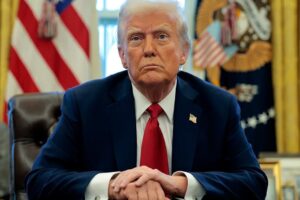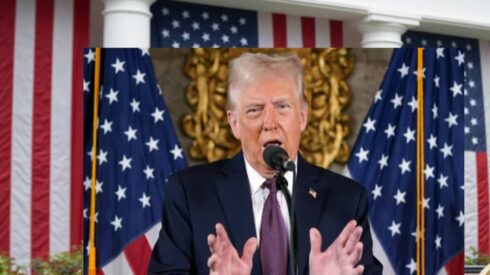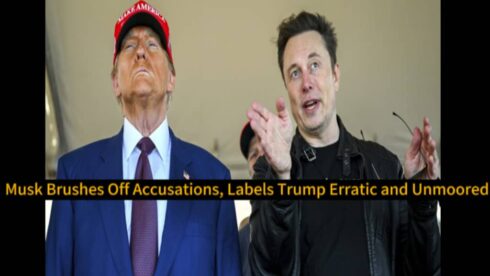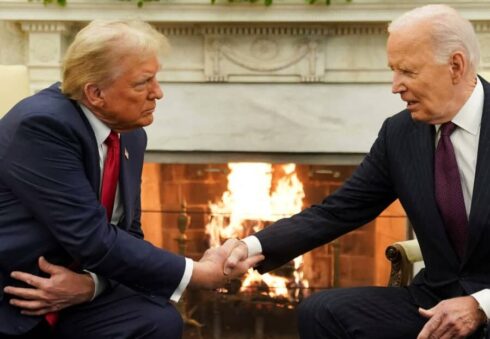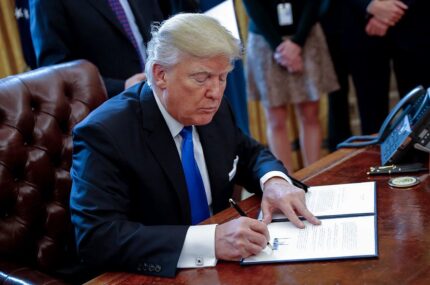Donald Trump’s relentless pursuit of a trade war has Republican lawmakers increasingly on edge as elections draw closer. While his combative trade tactics once energized the GOP base, the lasting economic damage is now stirring anxiety among incumbents fighting to retain House seats. From tariffs to retaliatory levies, the cascading effects of Trump’s policies are creating vulnerabilities in traditionally Republican districts.
Donald Trump’s influence on trade has also placed GOP candidates in a delicate position. As they campaign in battleground areas, they are faced with a stark dilemma: align with Trump’s protectionist stance or distance themselves to retain moderate and independent voters. Many now fear that Trump’s aggressive economic nationalism could tip the scales and lead to a Democratic takeover of the House of Representatives.
Rising Costs and Economic Strain: A Growing Dilemma for Republicans
Donald Trump’s trade war has triggered a surge in costs across various sectors of the economy. Manufacturing companies are grappling with rising raw material prices, while farmers are bearing the brunt of shrinking export markets. His tariffs have disrupted global supply chains, leading to higher consumer prices that are disproportionately impacting low- and middle-income households in Republican-leaning regions.
Donald Trump’s economic gamble has created financial unease among the very voters who once cheered his “America First” agenda. From small-town grocers to large-scale producers, businesses are increasingly vocal about the cost burdens they’ve incurred. Republicans must now contend with growing resentment from constituents who believe the trade war has done more to punish them than to protect American industry.
Trump’s Influence on Congressional Elections: Loyalty vs. Accountability
Donald Trump’s grip on the Republican Party remains formidable, yet increasingly controversial. His economic strategy—centered around tariffs and confrontation—has put GOP candidates in a bind. While embracing Trump remains vital to energizing the conservative base, it risks alienating centrist and swing voters who are weary of his volatile policy decisions.
Donald Trump’s polarizing legacy forces Republican lawmakers to walk a tightrope. Several have begun to subtly question the trade war’s merit, while others double down on loyalty, fearing backlash from Trump’s staunchest supporters. The intra-party tension could fracture Republican unity and endanger their ability to maintain control of the House.
The Backlash from Key States: Trade War Impact on Swing Districts
Donald Trump’s tariffs have had particularly harsh consequences in pivotal swing states like Michigan, Wisconsin, and Pennsylvania. Once viewed as champions of American industry, these states are now economic flashpoints. Job losses in manufacturing, disruptions in the auto sector, and declining farm exports are taking a visible toll.
Donald Trump’s trade agenda, once embraced with enthusiasm in these areas, is now being blamed for economic stagnation. Voters in these states are rethinking their support, which is bad news for Republicans relying on these districts to maintain their House majority. The political cost of the trade war could be highest in these very regions.
Public Opinion Shifts: Growing Frustration with Trump’s Trade Policies
Donald Trump’s tariffs have triggered a noticeable shift in public sentiment. What began as a bold stand against China and global competitors is now seen by many as a miscalculation. Recent polls reveal that frustration is mounting, particularly among blue-collar workers and small business owners—voters Republicans cannot afford to lose.
Donald Trump’s economic narrative is no longer resonating with the same force. Once cheered for standing up to foreign powers, he is now being blamed for economic setbacks at home. GOP candidates are being forced to confront tough questions on the campaign trail about whether their continued support of Trump’s trade war is politically viable.
The Road Ahead: How Republicans Can Navigate the Trade War Fallout
Donald Trump’s trade legacy will loom large as Republicans plan their next move. Some within the party are advocating for strategic recalibrations, including tax relief and market stabilization programs, to offset the damage done. Others propose a tempered version of Trump’s policies to appeal to both loyalists and critics.
Donald Trump’s dominance within the GOP makes any course correction politically risky, but ignoring the economic realities could be even more dangerous. The road to retaining the House will require Republicans to either fully embrace or decisively adapt Trump’s trade strategy—choices that will define the party’s future and its prospects in Congress.






